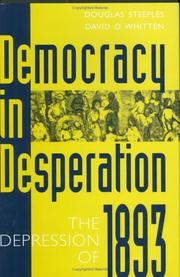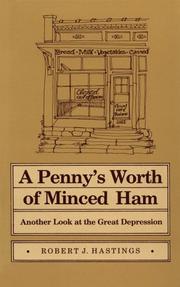| Listing 1 - 10 of 118 | << page >> |
Sort by
|
Book
ISBN: 3423045159 Year: 1985 Publisher: München Deutscher Taschenbuch Verlag
Abstract | Keywords | Export | Availability | Bookmark
 Loading...
Loading...Choose an application
- Reference Manager
- EndNote
- RefWorks (Direct export to RefWorks)
Depressions --- Inflation (Finance) --- Commercial crises --- Crises, Commercial --- Economic depressions --- Business cycles --- Recessions

ISBN: 0313002207 9780313002205 0313279438 9780313279430 9798400638961 Year: 1998 Publisher: Westport, Conn. : London : Greenwood Press, Bloomsbury Publishing,
Abstract | Keywords | Export | Availability | Bookmark
 Loading...
Loading...Choose an application
- Reference Manager
- EndNote
- RefWorks (Direct export to RefWorks)
The American depression of 1893 forced the US to change its way of life and plans for the future. This study examines the depression in detail, tracing and interpreting the business contraction of the 1890's in the context of national development.
Depressions --- Commercial crises --- Crises, Commercial --- Economic depressions --- Business cycles --- Recessions --- United States --- Politics and government --- Economic conditions

ISBN: 3774919674 963053035X 9783774919679 Year: 1983 Publisher: Bonn: Habelt,
Abstract | Keywords | Export | Availability | Bookmark
 Loading...
Loading...Choose an application
- Reference Manager
- EndNote
- RefWorks (Direct export to RefWorks)
Commercial law (Roman law) --- Depressions --- Commercial crises --- Crises, Commercial --- Economic depressions --- Business cycles --- Recessions --- Roman law --- Depressions. --- Commercial law (Roman law).
Book
ISBN: 1283491842 9786613491848 0821389548 0821389815 Year: 2011 Publisher: Washington, D.C. : World Bank,
Abstract | Keywords | Export | Availability | Bookmark
 Loading...
Loading...Choose an application
- Reference Manager
- EndNote
- RefWorks (Direct export to RefWorks)
Economists have long sought to predict how macroeconomic shocks willaffect individual welfare. Macroeconomic data and forecasts are easilyavailable when crises strike. But policy action requires not onlyunderstanding the magnitude of a macro shock, but also identifyingwhich households or individuals are being hurt by (or benefit from) thecrisis.A popular solution is to extrapolate the welfare impact of a shockfrom the historical response of income or consumption poverty tochanges in output, by estimating an 'elasticity' of poverty togrowth. Although this method provides an estimate for the agg
Depressions. --- Poverty. --- Economics. --- Economic theory --- Political economy --- Destitution --- Commercial crises --- Crises, Commercial --- Economic depressions --- Social sciences --- Economic man --- Wealth --- Basic needs --- Begging --- Poor --- Subsistence economy --- Business cycles --- Recessions
Book
ISBN: 9780199676293 0199676291 Year: 2017 Publisher: Oxford : Oxford University Press,
Abstract | Keywords | Export | Availability | Bookmark
 Loading...
Loading...Choose an application
- Reference Manager
- EndNote
- RefWorks (Direct export to RefWorks)
It is commonly held that the inter-war era marked little more than a ceasefire between two world wars, with the improvement in German-Allied relations forged at Locarno in 1925 cut short by the global economic turmoil that followed the 1929 Wall Street Crash. 'A Vision of Europe' challenges this received wisdom, offering a fundamental re-evaluation of inter-war Franco-German relations during the Great Depression and providing a fuller understanding of the historical origins of today's European Union. It demonstrates that rather than lapsing into mutual recrimination and national egotism, France and Germany engaged with the challenges of the post-1929 slump by way of plans for a Franco-German customs union and wider bilateral economic collaboration, whether across the Rhine, in the French Empire, or elsewhere in Europe. 0.
Depressions --- Crise économique (1929) --- France --- Germany --- Allemagne --- Foreign relations --- History --- Relations extérieures --- Commercial crises --- Crises, Commercial --- Economic depressions --- Business cycles --- Recessions --- Crise économique (1929) --- Relations extérieures

ISBN: 9004089586 9004618643 Year: 1989 Publisher: Leiden Brill
Abstract | Keywords | Export | Availability | Bookmark
 Loading...
Loading...Choose an application
- Reference Manager
- EndNote
- RefWorks (Direct export to RefWorks)
Depressions --- Commercial crises --- Crises, Commercial --- Economic depressions --- Business cycles --- Recessions --- France --- Economic conditions --- Foreign economic relations. --- Foreign relations --- History of France --- anno 1930-1939

ISBN: 0585187037 9780585187037 0809313030 9780809313037 0809313049 9780809313044 Year: 1986 Publisher: Carbondale, Ill. Southern Illinois University Press
Abstract | Keywords | Export | Availability | Bookmark
 Loading...
Loading...Choose an application
- Reference Manager
- EndNote
- RefWorks (Direct export to RefWorks)
Depressions --- Commercial crises --- Crises, Commercial --- Economic depressions --- Business cycles --- Recessions --- Personal narratives. --- Hastings, Robert J --- Childhood and youth. --- Marion (Ill.) --- United States --- Marion, Ill. --- Social life and customs

ISBN: 0813149886 9780813149882 0813121574 9780813121574 9780813193212 0813188857 0813193214 Year: 2009 Publisher: Lexington University Press of Kentucky
Abstract | Keywords | Export | Availability | Bookmark
 Loading...
Loading...Choose an application
- Reference Manager
- EndNote
- RefWorks (Direct export to RefWorks)
Frank Mathias was born in Maysville, Kentucky, (pop. 7000) in 1925 and grew up in nearby Carlisle (pop. 1500), where life in his small town was much like that in towns and villages all across America. He came of age in an era of total security; his parents never even had a key to their front door. Daily living was infused with gossip; no one had a secret, and everyone knew everyone else's business. Outdoor life was a vital part of growing up, and teachers and mentors instilled a sense of right and wrong in young people. Raised during the Great Depression, Mathias became a member of a fighting
World War, 1939-1945 --- Depressions --- Commercial crises --- Crises, Commercial --- Economic depressions --- Business cycles --- Recessions --- Mathias, Frank Furlong. --- Mathias, Frank F. --- Carlisle (Ky.) --- United States --- Social life and customs
Book
ISBN: 1469625504 9781469625508 9781469625492 1469625490 9798890851307 9781469625485 1469625482 Year: 2015 Publisher: Chapel Hill : Baltimore, Md. : University of North Carolina Press, Project MUSE,
Abstract | Keywords | Export | Availability | Bookmark
 Loading...
Loading...Choose an application
- Reference Manager
- EndNote
- RefWorks (Direct export to RefWorks)
A groundbreaking contribution to the history of the "long Civil Rights movement," Hammer and Hoe tells the story of how, during the 1930s and 40s, Communists took on Alabama's repressive, racist police state to fight for economic justice, civil and political rights, and racial equality. The Alabama Communist Party was made up of working people without a Euro-American radical political tradition: devoutly religious and semiliterate black laborers and sharecroppers, and a handful of whites, including unemployed industrial workers, housewives, youth, and renegade liberals. In this book, Robin D. G. Kelley reveals how the experiences and identities of these people from Alabama's farms, factories, mines, kitchens, and city streets shaped the Party's tactics and unique political culture. The result was a remarkably resilient movement forged in a racist world that had little tolerance for radicals. After discussing the book's origins and impact in a new preface written for this twenty-fifth-anniversary edition, Kelley reflects on what a militantly antiracist, radical movement in the heart of Dixie might teach contemporary social movements confronting rampant inequality, police violence, mass incarceration, and neoliberalism.
Depressions --- Communists --- Communism --- Commercial crises --- Crises, Commercial --- Economic depressions --- Business cycles --- Recessions --- Bolshevism --- Communist movements --- Leninism --- Maoism --- Marxism --- Trotskyism --- Collectivism --- Totalitarianism --- Post-communism --- Socialism --- Village communities --- History --- Persons
Book
ISBN: 1611178657 9781611178654 9781611178647 Year: 2018 Publisher: Columbia, South Carolina
Abstract | Keywords | Export | Availability | Bookmark
 Loading...
Loading...Choose an application
- Reference Manager
- EndNote
- RefWorks (Direct export to RefWorks)
"Charleston and the Great Depression tells many stories of the city during the 1930s--an era of tremendous want, hope, and change--through a collection of forty annotated primary documents. Included are letters, personal accounts, organizational reports, meeting minutes, speeches, photographs, oral history excerpts, and trial transcripts. Together they reveal the various ways in which ordinary lowcountry residents--largely excluded from formal politics--responded to the era's economic and social crises and made for themselves a 'New Deal'"--
Depressions --- Commercial crises --- Crises, Commercial --- Economic depressions --- Business cycles --- Recessions --- Charleston (S.C.) --- City of Charleston (S.C.) --- Charles-Town (S.C.) --- History
| Listing 1 - 10 of 118 | << page >> |
Sort by
|

 Search
Search Feedback
Feedback About UniCat
About UniCat  Help
Help News
News